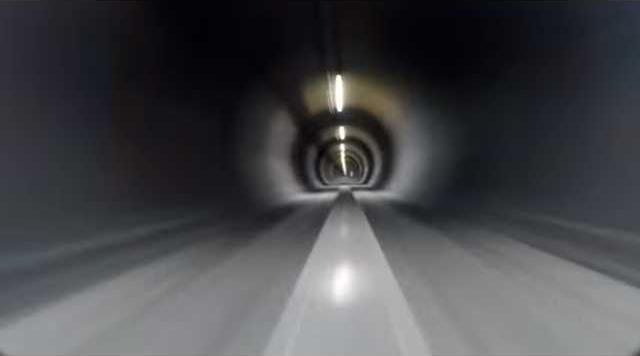Editors Note: This video may cause seizures for those sensitive to flashing lights.
THE FUTURE For everyone who's always wanted to speed through tunnels at breakneck speeds, Elon Musk wants to make your dream a reality. But for now, even though you probably can't experience what it feels like for yourself, you can get a pretty good view of what it would look like by watching this video.
The video comes from the winning team at the second SpaceX Hyperloop Pod Competition, held Aug. 25-27 in Hawthorne, California. The competition has one focus, maximum speed, and the WARR Hyperloop Team beat out everyone else when their pod reached a speed of 202 mph, the fastest speed ever achieved by a Hyperloop pod.
The WARR team is comprised of 30 students from the Technical University of Munich, and after winning the "Fastest Pod" category six months ago in the first Hyperloop competition, they went to work designing a lighter version to go up against 24 competitors at the second competition.
The video of their winning run is remarkable. It's only 26 seconds long, and in that time, the pod speeds up to more than triple the speed humans are used to going in cars, and it still manages to stop pretty abruptly.
If you're wondering how that last part is possible, so was one Twitter user who asked Elon Musk himself to use 140 characters or less to explain how the pod stops.
Here's Musk's response.
In a more detailed explanation from the WARR team, we learn that the pod continued to accelerate for three-quarters of the tube length before the brakes kicked in to stop the pod in around 3 seconds.
OK, that's amazing and the future is definitely going to be an exciting and fast place if Musk gets his way.
THE FUTURE For everyone who's always wanted to speed through tunnels at breakneck speeds, Elon Musk wants to make your dream a reality. But for now, even though you probably can't experience what it feels like for yourself, you can get a pretty good view of what it would look like by watching this video.
The video comes from the winning team at the second SpaceX Hyperloop Pod Competition, held Aug. 25-27 in Hawthorne, California. The competition has one focus, maximum speed, and the WARR Hyperloop Team beat out everyone else when their pod reached a speed of 202 mph, the fastest speed ever achieved by a Hyperloop pod.
The WARR team is comprised of 30 students from the Technical University of Munich, and after winning the "Fastest Pod" category six months ago in the first Hyperloop competition, they went to work designing a lighter version to go up against 24 competitors at the second competition.
The video of their winning run is remarkable. It's only 26 seconds long, and in that time, the pod speeds up to more than triple the speed humans are used to going in cars, and it still manages to stop pretty abruptly.
If you're wondering how that last part is possible, so was one Twitter user who asked Elon Musk himself to use 140 characters or less to explain how the pod stops.
Here's Musk's response.
In a more detailed explanation from the WARR team, we learn that the pod continued to accelerate for three-quarters of the tube length before the brakes kicked in to stop the pod in around 3 seconds.
OK, that's amazing and the future is definitely going to be an exciting and fast place if Musk gets his way.








